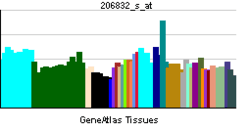SEMA3F
| View/Edit Human | View/Edit Mouse |
Semaphorin-3F is a protein that in humans is encoded by the SEMA3F gene.[3][4][5]
The semaphorins are a family of proteins that are involved in signaling. All the family members have a secretion signal, a 500-amino acid sema domain, and 16 conserved cysteine residues (Kolodkin et al., 1993). Sequence comparisons have grouped the secreted semaphorins into 3 general classes (classes 2, 3 and V), all of which also have an immunoglobulin domain. The semaphorin 3 family, consisting of human semaphorins 3A-G (SEMA3A; MIM 603961), chicken collapsin, and mouse semaphorins 3A-G, all have a basic domain at the C terminus. Chicken collapsin contributes to path finding by axons during development by inhibiting extension of growth cones (Luo et al., 1993) through an interaction with a collapsin response mediator protein of relative molecular mass 62K (CRMP62) (Goshima et al., 1995), a putative homolog of an axonal guidance associated UNC33 gene product (MIM 601168). SEMA3F is a secreted member of the semaphorin III family.[supplied by OMIM][5]
References
- ↑ "Human PubMed Reference:".
- ↑ "Mouse PubMed Reference:".
- ↑ Xiang RH, Hensel CH, Garcia DK, Carlson HC, Kok K, Daly MC, Kerbacher K, van den Berg A, Veldhuis P, Buys CH, Naylor SL (Sep 1996). "Isolation of the human semaphorin III/F gene (SEMA3F) at chromosome 3p21, a region deleted in lung cancer". Genomics. 32 (1): 39–48. doi:10.1006/geno.1996.0074. PMID 8786119.
- ↑ Roche J, Boldog F, Robinson M, Robinson L, Varella-Garcia M, Swanton M, Waggoner B, Fishel R, Franklin W, Gemmill R, Drabkin H (Jul 1996). "Distinct 3p21.3 deletions in lung cancer and identification of a new human semaphorin". Oncogene. 12 (6): 1289–97. PMID 8649831.
- 1 2 "Entrez Gene: SEMA3F sema domain, immunoglobulin domain (Ig), short basic domain, secreted, (semaphorin) 3F".
Further reading
- Goshima Y, Nakamura F, Strittmatter P, Strittmatter SM (1995). "Collapsin-induced growth cone collapse mediated by an intracellular protein related to UNC-33.". Nature. 376 (6540): 509–14. doi:10.1038/376509a0. PMID 7637782.
- Kolodkin AL, Matthes DJ, Goodman CS (1994). "The semaphorin genes encode a family of transmembrane and secreted growth cone guidance molecules.". Cell. 75 (7): 1389–99. doi:10.1016/0092-8674(93)90625-Z. PMID 8269517.
- Luo Y, Raible D, Raper JA (1993). "Collapsin: a protein in brain that induces the collapse and paralysis of neuronal growth cones.". Cell. 75 (2): 217–27. doi:10.1016/0092-8674(93)80064-L. PMID 8402908.
- Sekido Y, Bader S, Latif F, et al. (1996). "Human semaphorins A(V) and IV reside in the 3p21.3 small cell lung cancer deletion region and demonstrate distinct expression patterns.". Proc. Natl. Acad. Sci. U.S.A. 93 (9): 4120–5. doi:10.1073/pnas.93.9.4120. PMC 39497
 . PMID 8633026.
. PMID 8633026. - Chen H, He Z, Bagri A, Tessier-Lavigne M (1999). "Semaphorin-neuropilin interactions underlying sympathetic axon responses to class III semaphorins.". Neuron. 21 (6): 1283–90. doi:10.1016/S0896-6273(00)80648-0. PMID 9883722.
- Hirsch E, Hu LJ, Prigent A, et al. (1999). "Distribution of semaphorin IV in adult human brain.". Brain Res. 823 (1-2): 67–79. doi:10.1016/S0006-8993(99)01103-8. PMID 10095013.
- Brambilla E, Constantin B, Drabkin H, Roche J (2000). "Semaphorin SEMA3F localization in malignant human lung and cell lines: A suggested role in cell adhesion and cell migration.". Am. J. Pathol. 156 (3): 939–50. doi:10.1016/S0002-9440(10)64962-0. PMC 1876858
 . PMID 10702410.
. PMID 10702410. - Strausberg RL, Feingold EA, Grouse LH, et al. (2003). "Generation and initial analysis of more than 15,000 full-length human and mouse cDNA sequences.". Proc. Natl. Acad. Sci. U.S.A. 99 (26): 16899–903. doi:10.1073/pnas.242603899. PMC 139241
 . PMID 12477932.
. PMID 12477932. - Nasarre P, Constantin B, Rouhaud L, et al. (2003). "Semaphorin SEMA3F and VEGF have opposing effects on cell attachment and spreading.". Neoplasia. 5 (1): 83–92. doi:10.1016/s1476-5586(03)80020-9. PMC 1502125
 . PMID 12659673.
. PMID 12659673. - Lantuéjoul S, Constantin B, Drabkin H, et al. (2003). "Expression of VEGF, semaphorin SEMA3F, and their common receptors neuropilins NP1 and NP2 in preinvasive bronchial lesions, lung tumours, and cell lines.". J. Pathol. 200 (3): 336–47. doi:10.1002/path.1367. PMID 12845630.
- Gerhard DS, Wagner L, Feingold EA, et al. (2004). "The status, quality, and expansion of the NIH full-length cDNA project: the Mammalian Gene Collection (MGC).". Genome Res. 14 (10B): 2121–7. doi:10.1101/gr.2596504. PMC 528928
 . PMID 15489334.
. PMID 15489334. - Bielenberg DR, Hida Y, Shimizu A, et al. (2004). "Semaphorin 3F, a chemorepulsant for endothelial cells, induces a poorly vascularized, encapsulated, nonmetastatic tumor phenotype.". J. Clin. Invest. 114 (9): 1260–71. doi:10.1172/JCI21378. PMC 524226
 . PMID 15520858.
. PMID 15520858. - Gu C, Yoshida Y, Livet J, et al. (2005). "Semaphorin 3E and plexin-D1 control vascular pattern independently of neuropilins.". Science. 307 (5707): 265–8. doi:10.1126/science.1105416. PMID 15550623.
- Pope SN, Lee IR (2005). "Yeast two-hybrid identification of prostatic proteins interacting with human sex hormone-binding globulin.". J. Steroid Biochem. Mol. Biol. 94 (1-3): 203–8. doi:10.1016/j.jsbmb.2005.01.007. PMID 15862967.
- Kusy S, Nasarre P, Chan D, et al. (2005). "Selective suppression of in vivo tumorigenicity by semaphorin SEMA3F in lung cancer cells.". Neoplasia. 7 (5): 457–65. doi:10.1593/neo.04721. PMC 1501157
 . PMID 15967098.
. PMID 15967098. - Futamura M, Kamino H, Miyamoto Y, et al. (2007). "Possible role of semaphorin 3F, a candidate tumor suppressor gene at 3p21.3, in p53-regulated tumor angiogenesis suppression.". Cancer Res. 67 (4): 1451–60. doi:10.1158/0008-5472.CAN-06-2485. PMID 17308083.
- Guttmann-Raviv N, Shraga-Heled N, Varshavsky A, et al. (2007). "Semaphorin-3A and semaphorin-3F work together to repel endothelial cells and to inhibit their survival by induction of apoptosis.". J. Biol. Chem. 282 (36): 26294–305. doi:10.1074/jbc.M609711200. PMID 17569671.
- Menon L, Mihailescu MR (2007). "Interactions of the G quartet forming semaphorin 3F RNA with the RGG box domain of the fragile X protein family.". Nucleic Acids Res. 35 (16): 5379–92. doi:10.1093/nar/gkm581. PMC 2018618
 . PMID 17693432.
. PMID 17693432.


